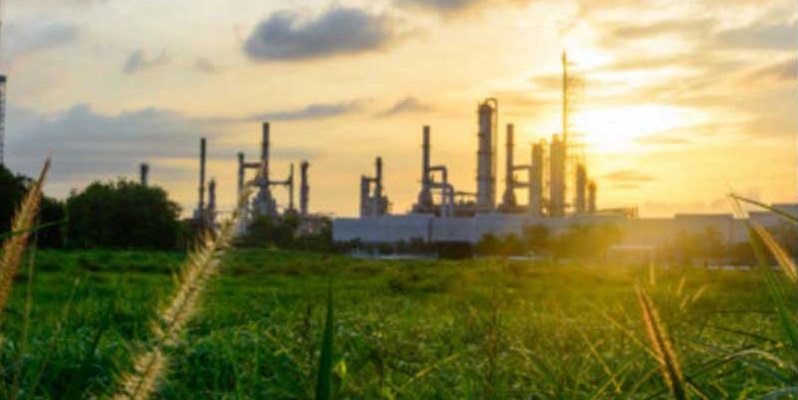Awareness
725 Acres of National Park Land at Risk for Big Oil Pipeline and Refinery Just Miles from Dakota Access

The Meridian Energy Group has convinced North Dakota’s elected officials to rezone almost a thousand acres of farmland, currently part of the Theodore Roosevelt National Park.
As Meridian’s own website proclaims,
“The Dakota Access Pipeline construction, now undergoing further review by Executive Branch agencies after a Federal Judge determined that the pipeline construction could proceed, has no bearing on Meridian’s plans to construct the Davis Refinery in southwest North Dakota.”

In other words, while everyone is looking over there at the Dakota Access Pipeline controversy, the Meridian Energy Group is going to rezone more than 725 acres of farmland, located off the border of the TRNP so that they can build a petroleum refinery and pipeline, with an additional 1,000 residential units and additional commercial developments just three miles from the national park’s entrance.
This development would not only dwarf the nearby town, but pose serious risks to the local air, water, and ecosystems.
“The town of Fryburg, which is the nearest town, it’s not very large at all. Only a handful of houses. It’s tiny,” said Eileen Andes, chief of interpretation and public affairs for the national park, adding that most of the residents probably lived on ranches. “Medora, which is the town where our park headquarters is, has a year-round population of about 110. Medora is the county seat for Billings County, and the town itself isn’t much bigger than four blocks by four blocks.”
Meridian also is proposing a gas-fired power plant to meet the refinery’s energy needs. As part of the contract, Vepica and BASIC Equipment will perform a series of engineering studies to define the design basis, costs, and schedule for the planned high-conversion refinery, which would serve Bakken crude oil producers and local liquid fuels and chemicals markets, the service companies said. The value of these contracts is not up for public scrutiny.
Residents of Fryburg are representative of a larger number of Americans, just like the Native Americans resisting at the Dakota Access Pipeline. Oil pipelines are notorious for causing environmental degradation and water supply contamination – much of which is not cleaned up years after an oil spill or pipeline leak occurs.
Just a few of these infamous ‘mistakes’ foretell of what will likely happen as other pipelines are planned and executed instead of turning to less dangerous and cleaner energy solutions like solar, wind, or hydro-created power.
The Keystone XL Pipeline which was touted as being “the safest and most advanced pipeline in operation in North America.” Nonetheless, millions of acres trees were clear-cut, and millions more gallons of toxic waste leached into the rivers from tailings ponds.
Residents in the area today still complain of health concerns caused by its construction. The same fossil fuel interests which pushed for the Keystone pipeline have been cutting, not creating, jobs: Despite generating $546 billion in profits between 2005 and 2010, ExxonMobil, Chevron, Shell, and BP reduced their U.S. workforce by 11,200 employees over that period.
The San Bruno Pipeline explosion that occurred on September 9, 2010, in San Bruno, California, a suburb of San Francisco, exploded with such force that residents thought that an earthquake had happened or a large jetliner had crashed.
The skyline was ablaze for hours when the gas carried by the pipeline fueled an explosion that left a 72-foot-long crater and hurled a 3,000-pound segment of pipeline 100 feet through the air. Five years after the disaster, the company responsible is still in attempting to ensure its pipeline network is safe. The company was ordered to perform complex pressure tests or verify the integrity of 1,800 miles of transmission pipeline. So far, it has completed testing on only 673 miles of the massive pipes.
In 2016 alone, the following pipeline catastrophes occurred:
In January, regulators filed a complaint against Oklahoma Natural Gas over a house that exploded, following reports of a gas leak which were ignored on eight previous occasions.
Also in January, an Atmos Energy gas transmission pipeline exploded in Texas, causing four families to evacuate their homes. Despite a pledge by the company to fix the faulty gas line in Dallas, TX, nothing was done to fix the problem.
1,500 gallons of crude oil spilled from a broken pipeline in Rozet, Wyoming in February of this year, filling up a nearby creek.
A six-inch crude oil pipeline operated by Belle Fourche Pipeline Company in western North Dakota was shut down following the discovery of a leak on Monday. The amount of the spill was not immediately known, but oil has leaked into the Ash Coulee Creek in Billings County. This happened just weeks ago.
There are additional pipeline disasters, too numerous to mention here, but clearly the fight against Big Oil does not start, nor end at Standing Rock.
Image credit: Nationalparkstraveler.com, featured image: Source
Typos, corrections and/or news tips? Email us at Contact@TheMindUnleashed.com
